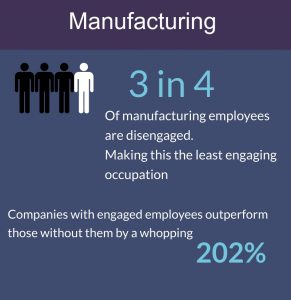Manufacturing
Workforce productivity directly correlates with effective decision making, high levels of focus, concentration and levels of discretionary effort, staff going the extra mile.
Having a detailed measured insight into these factors gives manufacturers a competitive and critical edge. It creates a safer psychological working environment, reduces labour turnover, absence and presenteeism levels.
Most manufacturers have embraced physical safety to an admirable degree. Innovative leaders now see the value of taking the same level of commitment and rigor and are adopting a psychologically safe workplace.
A psychologically safe environment is one where there is no avoidable psychological harm.
Characteristics include;
- Safe to ask for help
- Safe to express an opinion contrary to current practise
- Free from mocking and bullying
- Work demands match skill capacity and capability
Insightful leaders in manufacturing are now measuring psychological safety, they factor in the strategic and operational risks faced but implementing incremental improvements enables them to gain a commercial advantage as well as enhancing their workforces’ Wellbeing.
- Interestingly manufacturing ranked within the bottom 10% of industries for Wellbeing
- Although over 60% of manufacturing organisations carry out a physical risk intervention, less than 15% currently assess risks to mental health
The role of health and wellbeing in manufacturing report also found that improving mental health at work can boost productivity by up to 10%, and that 70 million working days are lost each year due to mental illness.

Gallup found that when businesses had higher engagement, they experienced a decrease in absenteeism and staff turnover – factors that are particularly common in manufacturing.
Gallup noted that firms with higher engagement levels reported 70% fewer safety-related incidents.
Click Here to Download our Manufacturing Specific Brochure.





